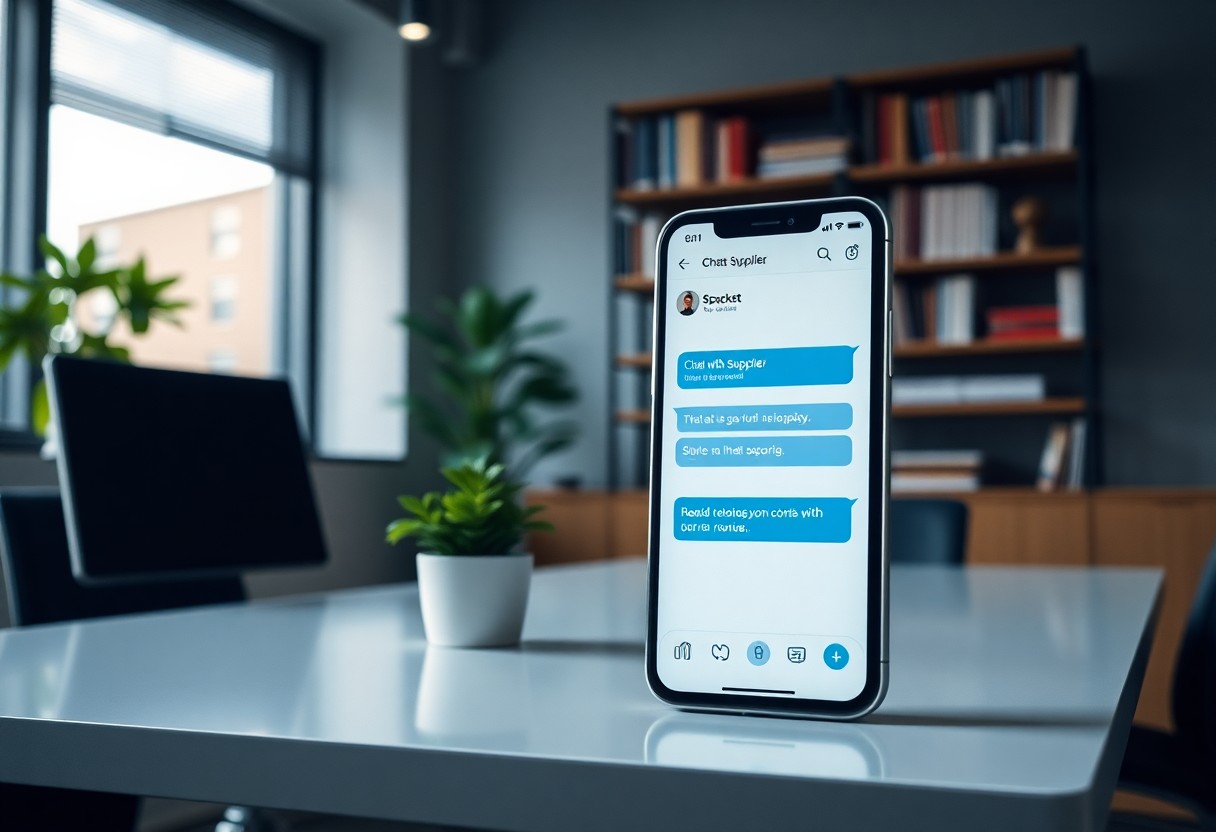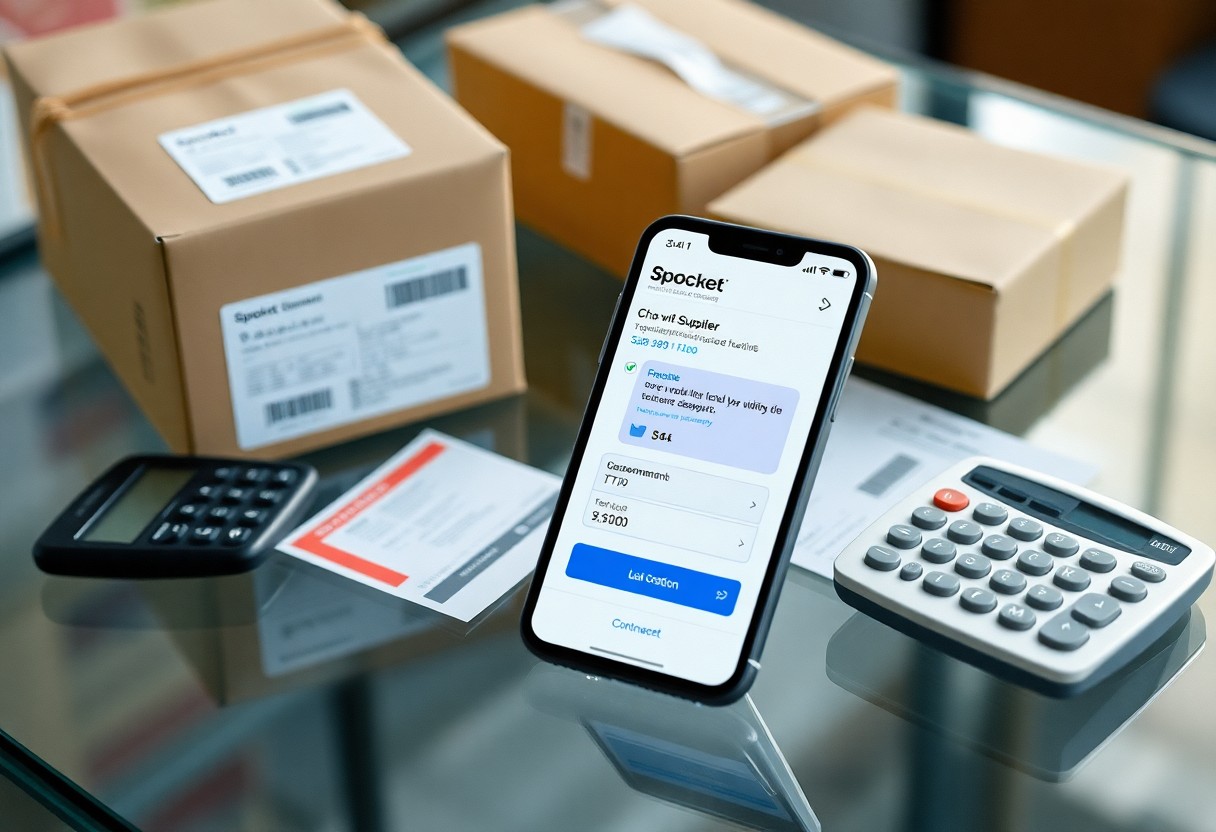Communicating with Suppliers on Spocket – The "Chat with Supplier" Feature
There’s a powerful tool at your fingertips when using Spocket: the “Chat with Supplier” feature. This direct messaging system allows you to easily inquire about stock levels, ask about customization options, and resolve issues with specific orders. Understanding how and when to utilize this feature can significantly enhance your communication efficiency. By leveraging the chat function, you can ensure a smooth collaboration with your suppliers, addressing any questions or concerns promptly. To learn more about supplier obligations, refer to What are my responsibilities as a supplier on Spocket?
You can enhance your dropshipping experience by utilizing the “Chat with Supplier” feature on Spocket. This direct messaging system allows you to quickly resolve issues with your orders, inquire about stock availability, and discuss customization options directly with suppliers. Knowing how and when to use this feature can significantly improve your communication and relationship with suppliers. For more detailed guidance, check the FAQ for Spocket Suppliers.

Overview of the “Chat with Supplier” Feature
The “Chat with Supplier” feature on Spocket streamlines your communication with suppliers, enabling you to address various issues effectively. This tool allows for real-time discussions about products, order statuses, and potential customizations, ensuring you maintain an active and responsive relationship with your suppliers. By leveraging this feature, you can tackle concerns promptly and enhance your overall dropshipping efficiency.
What is the “Chat with Supplier” Feature?
The “Chat with Supplier” feature is a direct messaging system within Spocket that allows you to connect with suppliers instantly. It facilitates communication regarding product inquiries, stock availability, and order-related issues, making it integral for managing your dropshipping business. This feature empowers you to obtain quick responses, ensuring you can make informed decisions and keep your customers satisfied.
How to Access the Messaging System
To access the “Chat with Supplier” feature, navigate to your Spocket dashboard and select the relevant supplier from your product list. Click on their profile, and you will find the chat option prominently displayed. This intuitive design allows you to initiate conversations without any hassle, ensuring a seamless communication experience.
Upon selecting a supplier, a dedicated chat window will open, enabling you to type your message directly. Utilize this space to inquire about stock levels, ask about customization options, or address any order-related concerns. The interface is user-friendly, designed to keep your inquiries organized and easy to follow, which is important for maintaining clarity in your communications, especially as your business scales.

Overview of the “Chat with Supplier” Feature
The “Chat with Supplier” feature on Spocket provides a convenient platform for direct communication with your suppliers. This real-time messaging tool helps streamline discussions regarding product inquiries, order specifics, or customizations. It fosters a more interactive relationship, enabling quick responses that can enhance your overall dropshipping efficiency.
Purpose and Benefits
The primary purpose of the “Chat with Supplier” feature is to facilitate seamless communication between you and your suppliers, offering significant benefits such as immediate resolution of queries, clarity on products, and the ability to negotiate directly. This can lead to stronger partnerships and improved customer satisfaction.
How to Access the Chat Feature
To access the “Chat with Supplier” feature, navigate to your Spocket dashboard and select the supplier whose products you wish to discuss. You will find a chat icon or button on their profile page, allowing you to start a conversation instantly.
After locating the supplier, click on the chat icon to open the messaging interface. You can send inquiries about product availability, request details on customization options, or resolve order-related issues without any delays. The user-friendly design ensures that you can keep track of your conversations and refer back to them as needed, making your communications both efficient and effective.
Common Use Cases for Supplier Communication
A direct line of communication with your suppliers enhances your dropshipping operations. Common scenarios include checking stock levels, discussing customization opportunities, and troubleshooting order-related issues. Understanding how to effectively employ these interactions can streamline your processes. For more insights on this, check out How to Start Dropshipping with Spocket in 5 Easy Steps.
Inquiring About Stock Availability
When launching a new product or dealing with popular items, you should frequently check on stock levels. Utilize the chat feature to ask your supplier about current inventory, estimated restock times, and potential backorder situations. Having this information helps you manage your store effectively, ensuring you don’t sell items that are out of stock.
Asking About Customization Options
Customization can set your offerings apart from competitors. Leverage the chat tool to explore options such as changes in colors, sizes, or branding features. Understanding what’s available can enhance your product lineup to better meet your customers’ needs.
For instance, some suppliers may allow you to modify designs or add your logo, enabling you to create a unique selling proposition. By discussing specifics directly through chat, you can clarify what customization is feasible and the associated costs, allowing you to make informed business decisions while ensuring the final product aligns with your brand vision.

Common Use Cases for Direct Messaging
Utilizing the “Chat with Supplier” feature on Spocket can significantly enhance your operational efficiency by enabling you to address specific needs in real-time. You can streamline your purchasing processes with direct communication, ensuring that you have the necessary information on hand to make informed decisions. Common scenarios include: inquiring about stock status, discussing potential product customizations, and resolving any issues related to your orders.
Inquiring About Stock Availability
When you need to check stock availability, the direct messaging option offers a quick way to get up-to-date information. By asking suppliers about inventory levels, you can avoid delays in your order fulfillment and ensure you have enough products to meet customer demand. This proactive approach helps you maintain a seamless shopping experience for your customers.
Asking About Customization Options
Inquiring about customization options via direct messaging is important when you want to offer personalized products to your customers. Establishing a dialogue with your supplier can provide insights into what modifications are possible, whether that’s variations in color, size, or branding. This active engagement can open up new opportunities to tailor offerings specifically for your target market, ultimately enhancing your brand’s appeal.
For instance, if you’re looking to sell apparel, you might ask suppliers about options for adding custom logos or changing fabric materials. Many suppliers are open to discussions about alterations, which can lead to unique selling points for your products. By actively pursuing these customization opportunities, you not only differentiate your offerings but also cater directly to customer preferences, potentially increasing sales and satisfaction rates. Always ensure you clarify any associated costs or minimum order quantities when discussing customizations to avoid surprises later on.

Resolving Order Issues
Order issues may arise unexpectedly, and utilizing the “Chat with Supplier” feature allows you to address these problems efficiently. Whether it’s a delayed shipment, incorrect item received, or quality concerns, direct communication can help clarify the situation and facilitate prompt solutions. Being proactive in reaching out ensures smoother transactions and preserves your customer satisfaction.
Reporting Problems with Orders
When you encounter an issue with an order, promptly use the chat feature to report the problem to your supplier. Clearly describe the issue, including order numbers and specifics about what went wrong, as this will aid in resolving the matter quickly. Advocating for your customer experience starts with effective communication.
Following Up on Resolutions
After reporting a problem, it’s important to follow up on the resolution. Suppliers may need time to investigate the issue, but consistent communication shows that you value a swift resolution. Establishing a timeline for updates or requesting confirmation helps keep everything on track.
By initiating a follow-up, you reaffirm your commitment to resolving the matter efficiently. If a response isn’t received within the agreed timeline, don’t hesitate to check in again. A structured approach, such as noting dates and details discussed, prepares you for further conversations. This diligence not only fosters a reliable relationship with suppliers but also reflects positively on your business’s reputation with customers, as they see you actively working to resolve issues. Effective follow-ups can ultimately lead to improved supplier collaboration and customer loyalty.

Resolving Order Issues
When issues arise with an order, utilizing the “Chat with Supplier” feature is key to swiftly resolving concerns. This direct communication allows you to clarify misunderstandings, request updates, and negotiate solutions, ensuring that your customers remain satisfied and informed. Quick responses from suppliers can prevent further complications and maintain your business reputation.
Communicating Shipping Delays
If you encounter shipping delays, reaching out to your supplier via the chat feature allows you to obtain immediate updates and estimated timelines. You can effectively communicate your customer’s needs and expectations, leading to timely information that helps manage customer relations and mitigate disappointment. Keeping an open line of communication ensures transparency.
Addressing Product Quality Concerns
In the event of product quality issues, use the chat function to express your concerns directly with the supplier. Clearly outline specific problems, whether they relate to defects, material mismatches, or inconsistencies with product descriptions. By providing detailed feedback, you not only assist in resolving the issue but also help the supplier improve their offerings.
For example, if you receive a shipment of items that does not match the quality standards you advertised, share photos and specific discrepancies in your message. This approach not only accelerates the resolution process but also establishes a precedent for quality assurance. Suppliers appreciate constructive feedback, as it enables them to take corrective action and reinforces your commitment to customer satisfaction.
Best Practices for Effective Communication
To maximize your interactions with suppliers on Spocket, focusing on best practices can lead to more productive conversations. Keep your inquiries relevant and timely, ensuring you ask the right questions to get the information you need. Avoid overwhelming suppliers with multiple unrelated inquiries at once, and establish a clear dialogue that enhances understanding and builds relationships.
Crafting Clear Messages
When messaging suppliers, clarity is key. Use direct language and be specific about your needs or questions. For instance, instead of asking, “Can you tell me about this product?”, pose tailored inquiries like, “What is the production time for this item?” This approach minimizes confusion, ensuring that you receive the precise information necessary for your business operations.
Maintaining Professionalism
Professional communication fosters trust with your suppliers, which is necessary for long-term relationships. Always address your suppliers respectfully, using proper grammar and punctuation. Avoid using slang or overly casual language. Furthermore, acknowledge their responses, showing appreciation for their efforts and time. Such practices enhance your reputation, making them more inclined to assist you promptly.
Demonstrating professionalism involves more than just polite language; it includes being punctual with your responses and keeping your promises. If you need further details from suppliers, follow up within a reasonable timeframe and remain courteous, even if there are delays. Ensure that every interaction reflects your commitment to quality, as this not only strengthens the business relationship but also can lead to negotiations for better terms or faster service in the future.
Best Practices for Effective Communication
Effective communication can significantly enhance your supplier relationships on Spocket. By employing best practices, you’ll not only clarify your needs but also foster trust, leading to smoother operations. Aim to keep interactions professional yet friendly, ensuring that both you and your suppliers feel valued in the communication process.
Writing Clear and Concise Messages
When communicating with suppliers, clarity is key. Frame your messages with specific questions or requests that highlight the information you need. For example, instead of asking, “Can you tell me more about this product?”, specify your interest: “What are the dimensions and material of this product?” This precision saves time and minimizes misunderstandings.
Maintaining Professionalism
Upholding a professional demeanor in your conversations reflects positively on your business. Use polite language, proper grammar, and respect for your suppliers’ time to create a productive dialogue. It’s beneficial to start your messages with a simple greeting and to thank them for their assistance, reinforcing a professional tone.
In addition, project respect through timely responses. Suppliers appreciate when you address their messages promptly, as it indicates you value their input and time. Keep in mind that long messages can overwhelm; thus, breaking them into bullet points or numbered lists can enhance clarity. If you encounter challenges, approach them constructively rather than confrontationally. This fosters a collaborative atmosphere, ensuring that your communication remains both effective and courteous. Strong relationships with suppliers can lead to better prices, favorable terms, and improved service, ultimately enhancing your business’s success.
Tips for Building Strong Supplier Relationships
Building robust relationships with suppliers facilitates smoother operations and better results. Focus on these key strategies:
- Communicate consistently to strengthen connections.
- Be open to feedback to foster mutual growth.
- Collaborate on projects for shared success.
- Show appreciation to enhance engagement.
Perceiving your suppliers as partners rather than just vendors will pave the way for lasting collaboration. For insights on How can I communicate with my retailer?, consult the Spocket help articles.
Establishing Trust through Consistent Communication
Trust is the bedrock of any successful supplier relationship. Consistent communication ensures clarity and aligns expectations. Regular updates about stock levels, shipment schedules, and potential delays keep suppliers informed and demonstrate your commitment to transparency. By making it a habit to check in frequently, you lay the groundwork for a dependable partnership.
Seeking Feedback and Collaboration
Engaging suppliers in the decision-making process encourages a collaborative environment that benefits both parties. Actively seek their feedback on product performance and market trends, allowing for enhancements and adjustments. This not only showcases your appreciation for their expertise but also integrates their insights into your strategy, resulting in a more tailored approach that maximizes sales opportunities.
Fostering a culture of feedback facilitates innovation and improvement. You can establish regular check-in points where you gather insights from suppliers about what’s working well and what isn’t. For instance, if a particular product isn’t moving as expected, their expertise can guide you on potential adjustments or promotions. By working together, you create a dynamic that encourages shared goals and aligned efforts, benefiting both your store and the supplier’s business.
Tips for Building a Good Relationship with Suppliers
To cultivate a strong relationship with your suppliers, prioritize open communication and respect. Be clear about your needs and timelines. Regular check-ins can enhance trust and transparency. Ensure you express appreciation for their efforts and provide constructive feedback when necessary. Consistency and reliability will strengthen your partnership. Utilizing resources like How can I communicate with my retailer? can facilitate better exchanges. Perceiving your suppliers as partners, rather than just vendors, fosters collaboration.
Establishing Rapport
Building rapport is vital for effective supplier relationships. Start by engaging in casual conversations, asking about their business, and sharing your experiences. When you express genuine interest, it creates a positive atmosphere. Familiarity helps in easing communication, especially during negotiations or troubleshooting. As you maintain regular contact, mutual understanding and goodwill grow stronger, benefiting both parties.
Providing Feedback
Offering feedback is vital for continuous improvement. When you share your thoughts on their products or service, you help suppliers understand your expectations. Be specific in your feedback—highlight what worked well and what didn’t. Acknowledging their strengths alongside areas for improvement cultivates a constructive dialogue that enhances your collaboration.
Addressing the nuances of providing feedback can significantly impact your relationship with suppliers. By stating what met or exceeded your expectations, you encourage best practices. Conversely, when discussing issues, frame them as opportunities for growth rather than failures. Providing concrete examples helps suppliers make necessary adjustments more effectively. When they see the direct effects of your feedback, it fosters a culture of responsiveness and growth that benefits your business as well.

Troubleshooting Communication Issues
When communication with suppliers falls short, you need to identify the root cause. Common issues include slow response times, misunderstandings, or technical glitches. Verify if your messages were sent correctly and check for any internet connectivity problems on your end. You can also try reaching out during their business hours to increase the likelihood of a prompt reply.
What to Do If a Supplier Doesn’t Respond
If a supplier fails to respond within a reasonable timeframe, consider sending a polite follow-up message. Be clear and concise in your communication, reiterating your original inquiry. If there’s still no response after a couple of attempts, explore alternative communication channels or consider evaluating your options with other suppliers.
Alternatives to Direct Messaging
Sometimes, direct messaging may not be the most effective channel for communication. Instead, utilize email, phone calls, or even social media messaging to reach out to suppliers. These platforms often provide different avenues for immediate engagement, particularly if you need urgent inquiries addressed. You may find that a brief phone call can clear up potential misunderstandings more effectively than waiting for multiple replies in a chat format.
FAQs About Supplier Communication on Spocket
Common Questions and Answers
The Chat with Supplier feature on Spocket often raises questions. Users commonly ask about response times, how to initiate conversations, and best practices for communication. For a comprehensive guide on utilizing Spocket for effective dropshipping, check out How to Use Spocket for Dropshipping Effectively (Detailed …. This resource clarifies these nuances, helping you streamline your supplier interactions.
Troubleshooting Communication Issues
Sometimes, you may encounter problems while communicating with suppliers. Issues can arise from delays in responses, misunderstandings, or technical glitches within the chat feature. If you face any obstacles, it’s helpful to follow up politely, ensure your message is clear, and check your internet connection.
For instance, if a supplier doesn’t respond within your expected timeframe, consider sending a gentle reminder. If you notice recurring issues with the chat not displaying messages correctly, try logging out and back into Spocket or clearing your browser’s cache. Documenting these instances can also help when you seek support from Spocket’s customer service.
Final Words
Conclusively, utilizing the “Chat with Supplier” feature on Spocket enhances your ability to communicate effectively with suppliers. You can inquire about stock availability, discuss customization options, and swiftly resolve issues related to specific orders. By leveraging this direct messaging system, you streamline your operations and foster stronger relationships with suppliers, ensuring your business runs smoothly. Effective communication not only addresses your immediate needs but also contributes to long-term partnerships and success in your ventures.
Summing up
As a reminder, utilizing the “Chat with Supplier” feature on Spocket enhances your communication with suppliers, allowing you to efficiently inquire about stock availability, discuss customization options, and address any order-specific issues directly. This direct messaging system streamlines your interactions, making it easier for you to maintain strong supplier relationships and ensure your business runs smoothly. By being proactive in communication, you can ensure timely responses and improve the overall efficiency of your operations.
FAQ
Q: How can I access the ‘Chat with Supplier’ feature on Spocket?
A: To access the ‘Chat with Supplier’ feature, log in to your Spocket account, navigate to your orders, and select the specific supplier you wish to communicate with. There will be an option to start a chat directly from their profile page.
Q: What types of inquiries can I make using the chat feature?
A: You can inquire about stock availability, ask questions regarding product customization options, seek clarification on shipping times, and address any specific issues related to your orders.
Q: Is there a limit to what I can ask suppliers through the chat?
A: While there is no strict limit on questions, it is recommended to focus on product-related inquiries or order issues to maintain a clear and effective communication channel.
Q: How quickly can I expect a response from suppliers when using the chat feature?
A: Response times may vary by supplier, but most tend to reply within a few hours during their business hours. Be mindful of different time zones that may affect response speed.
Q: What should I do if I encounter issues that cannot be resolved through the chat?
A: If your issue remains unresolved after chatting with the supplier, you can escalate the matter by contacting Spocket’s customer support for further assistance.

